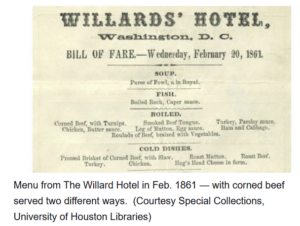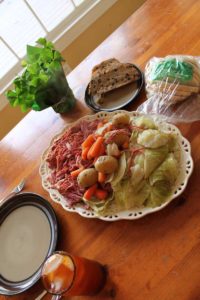
 It is rare that this blog publishes on St. Patrick’s day! I have checked my blog history and noted that although I mention St. Patrick’s day every year during the week of March 17 in my photo descriptions, I have never written about St. Patrick in the blog content.
It is rare that this blog publishes on St. Patrick’s day! I have checked my blog history and noted that although I mention St. Patrick’s day every year during the week of March 17 in my photo descriptions, I have never written about St. Patrick in the blog content.
St. Patrick — an appetite for Christ.
It is difficult to sort legend and myth from truth about St. Patrick online. I reached out to my friend, Daniel, who has traveled to Ireland to participate in academic pilgrammages with archeologists and experts. In Daniel’s words, “the most unique and meaningful thing about Patrick” is that “he is the only church father and writer of antiquity to have survived slavery and lived to write about it.” Daniel adds, “Other than his CONFESSIONS, the only surviving LETTER is his “Letter to Cororticus” that is basically an abolitionist letter that almost got his Bishopry taken away from him!”
 I found this ARTICLE that purposes to sort fact from fiction regarding St. Patrick. Here are two excerpts regarded as truth by the author:
I found this ARTICLE that purposes to sort fact from fiction regarding St. Patrick. Here are two excerpts regarded as truth by the author:
Patrick would come to be known as the “Apostle of Ireland.” He planted churches, the first one likely at a place called Saul, in Northern Ireland, a bit inland from the coast and just below Belfast. Patrick planted more churches as he crisscrossed Ireland.
Perhaps we remember him best by reflecting on the “St. Patrick’s Breastplate,” which has traditionally been attributed to him. The word breastplate is a translation of the Latin word lorica, a prayer, especially for protection. These prayers would be written out and at times placed on shields of soldiers and knights as they went out to battle. St. Patrick’s Lorica points beyond himself and his adventurous life. It points to Christ, the one he proclaimed to the people who had taken him captive:
Christ with me,
Christ before me,
Christ behind me,
Christ in me,
Christ beneath me,
Christ above me,
Christ on my right,
Christ on my left,
Christ when I lie down,
Christ when I sit down,
Christ when I arise,
Christ in the heart of every man who thinks of me,
Christ in the mouth of everyone who speaks of me,
Christ in every eye that sees me,
Christ in every ear that hears me.
Abraham Lincoln — an appetite for corned beef and cabbage.
Not only am I largely Irish myself, I have been married to an Irishman for 30 years and have perfected the making of corned beef and cabbage. This week my husband shared an ARTICLE with me about Abraham Lincoln’s plausible influence on popularizing corned beef and cabbage in America. I never heard about this Abraham Lincoln connection before!
Because the Irish were poor, potatoes were the mainstay of their diet. When the potato famine occurred in Ireland and starvation was rampant, “about 1.2 million immigrants arrived from Ireland in just eight years, from 1847 to 1854.” My distant grandfather immigrated to the U.S. in 1850. Because of the famine, “the election of Lincoln in 1860 was the first presidential election in which new Irish-American citizens were a major political force.”
 Guess what Lincoln selected for his Inaugural meal? “Perhaps the proximity to St. Patrick’s Day influenced President Lincoln’s consumption of corned beef, cabbage and parsley potatoes” at The Willard Hotel in Washington, D.C., but his “taste for corned beef gained national attention.”
Guess what Lincoln selected for his Inaugural meal? “Perhaps the proximity to St. Patrick’s Day influenced President Lincoln’s consumption of corned beef, cabbage and parsley potatoes” at The Willard Hotel in Washington, D.C., but his “taste for corned beef gained national attention.”
Interestingly, the Irish had been too poor to eat corned beef with their potatoes in Ireland, but their “fortunes changed when they arrived in the United States. The Irish could afford meat for the first time.” My husband reports that his mother made corned beef and cabbage every Wednesday. It was my husband’s job as a young boy to walk the warm meal up the back stairs to his grandfather who lived above them.
There are two great men to celebrate today and one great meal!
 Picture Explanation: Corned beef and cabbage over the years. Different platters. Different stoves. Different homes. Different gatherings around the table. Always delicious.
Picture Explanation: Corned beef and cabbage over the years. Different platters. Different stoves. Different homes. Different gatherings around the table. Always delicious.
And a photo of my friend Daniel with his wife, Margee, one of my best friends.
Speaking of God’s influence through family lines and picking our lineage with purpose: If you are interested in being contacted to participate in a One Gritty Blink Bible study, click on the Oaks Ministries link below and send me an email so I can place you on a list to be contacted as online and face-to-face studies are planned. Let’s not just focus on things in this short life, but also what counts for eternity!
Note: No part of my posts are derived from A.I. Thoughts and writing stem from my mind and heart as I process life week-by-week and continue to grow in my understanding of God and how to apply His wisdom to the world around me.
© 2024 by Oaks Ministries. All rights reserved.
I planted, Apollos watered, but God was causing the growth. So then neither the one who plants nor the one who waters is anything, but God who causes growth.
1 Corinthians 3:6
Ralph Waldo Emerson
6 Responses
Happy Saint Patrick’s Day, my Irish friends! I know more about this celebrated day because of you! What a timely post. I prayed the prayer above for myself and others today. I honor someone who endured slavery, wrote against it despite potential and actual repercussions, and planted churches including one named Saul! I too learned here that breastplate comes from the Latin for prayer of protection and that President Lincoln ordered your traditional meal for his inauguration! How cool!
I am glad it was a fun post for you too!
Laurie,
I loved your Post and am going to quote you on my Post. I know you have given me approval, and it is something I did not know about St. Patrick. My ancestors came over in 1701 before the”Potato Famine” I thought I knew a lot about St. Patrick until I read your Post today❣️
“May your troubles be less and your Blessings be more.
Let nothing but happiness come through your door.”
You know so much! My friend Daniel gets the credit for St. Patrick knowledge. I relished the Breastplate Prayer more than ever before this year. The thought crossed my mind to memorize it.
So happy you enjoyed the post!
Thanks for the post Laurie. I have potato famine ancestors on my dad’s side from Counties Clare, Westmeath, and Cork. These were the last of my ancestors to come to America. I also have “Scotch-Irish” ancestors from N. Ireland, but the Ulster Scots came from Germanic Scots stock. Did you know that Scots is the closest language to English?
I am both green and orange with a lot of DNA from Celtic Highlands Scotland, too.
St. Patrick’s Day has a very special place for both our families! Thank you, Lord, for sending Patrick to Ireland!
Fun information, my friend! I enjoy being Irish also!